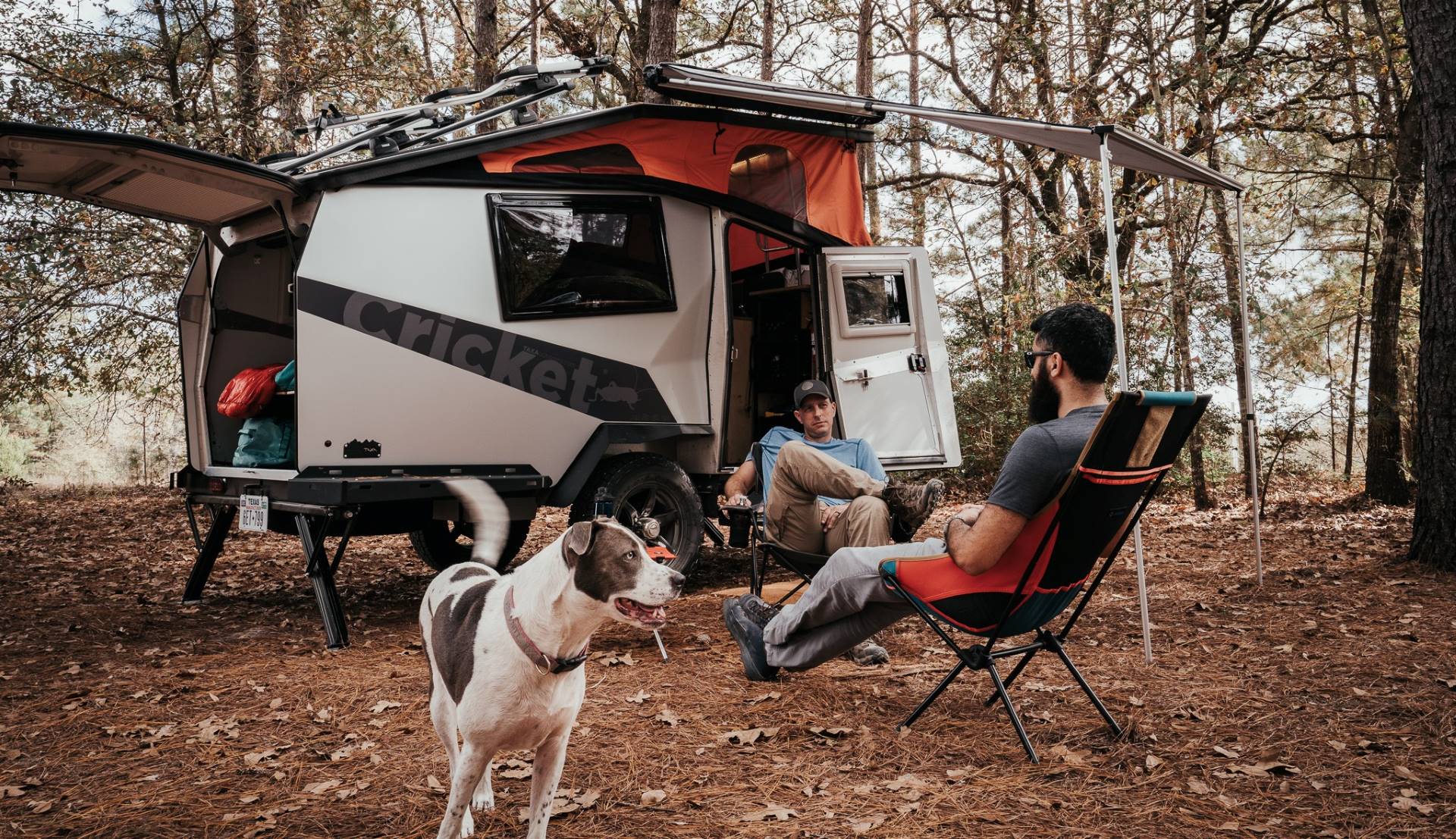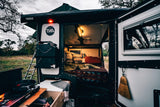Embarking on your next outdoor adventure is an exciting prospect, and an important part of your planning is choosing the right companion for your journey — the perfect camper. In this guide, we compare two popular choices among outdoor enthusiasts — pop-up (or tent) trailers and truck campers. Each has its own charm and caters to various camping styles and needs. We're not here to pick a winner, but rather to give you a rundown of what each type brings to the table. This way, you can make a choice that resonates with your personal camping style and preferences. Let's dive in and find your ideal outdoor partner!
Truck campers vs. pop-up trailers: what’s the difference?
A truck camper is essentially a compact living space that mounts directly onto the bed of a pickup truck. This configuration offers a blend of mobility and convenience, as it leverages the truck's existing capabilities for transportation and support. Truck campers are known for their ease of maneuverability, making them ideal for explorers who prefer to travel off the beaten path or navigate through varied terrain. They often include basic amenities such as a bed, kitchenette, and sometimes a bathroom, all compactly arranged within a limited space.
On the other hand, pop-up trailers, also known as tent trailers, are towable units that expand and unfold to reveal a spacious camping setup. When collapsed, these trailers are relatively compact, enhancing towability and storage. Pop-up trailers typically provide more living space than truck campers when fully expanded, including sleeping areas, dinette sets, and sometimes even small kitchen areas. They are well-suited for campers who value space and comfort but don't mind some additional setup time and requirements of a towable unit.
Let’s dive deeper into comparing these two across various dimensions, such as setup and takedown, storage capacity, comfort, and versatility to help you decide what’s the best choice for your needs.
Versatility
Both options offer flexibility in various ways, adapting to different camping styles and needs. However, their versatility manifests differently, influenced by their design and functionality.
Truck campers are often celebrated for their exceptional versatility. Mounted directly onto the bed of a pickup truck, they allow for easy access to a wide range of locations that might be challenging for larger RVs or trailers. This makes them ideal for those who wish to explore off-road terrains, navigate narrow roads, or camp in secluded spots. Truck campers also make it possible to detach the camper at a campsite and use the truck independently, a useful feature for day trips or running errands.
Pop-up trailers, while not as inherently accessible as truck campers, still offer more versatility than traditional, larger RVs and trailers. Their collapsible nature makes them easier to tow and store, and once set up, they provide a surprisingly spacious living area. This balance between compactness while traveling and spaciousness when set up makes pop-up trailers a flexible option for those who prioritize living space but don't require all the rugged mobility of a truck camper.
Space
Truck campers are typically more compact, designed to fit snugly onto the bed of a pickup truck. This compactness can be seen as a double-edged sword; while it allows for greater mobility and access to more remote or constrained areas, it also limits the available living and storage space. Inside a truck camper, space is efficiently utilized, with multi-functional areas and clever storage solutions. These campers are ideal for solo travelers or couples who prioritize ease of movement and are comfortable with cozy, confined spaces. The compact nature also means less room for amenities, which might be a consideration for those who prefer more home-like comforts on the road.
On the other hand, pop-up trailers offer more spacious accommodations once they are expanded. They are designed to provide a larger living area, including separate sleeping spaces, dinettes, and sometimes even small kitchenettes. This additional space is particularly beneficial for families or groups, offering room to move around and store camping essentials. The trade-off, however, is in needing to tow the trailer and the need for a larger space to set up camp. While they are more compact when collapsed, their expanded form requires more room at campgrounds and might not be suitable for extremely rugged or off-grid camping.
Amenities
Truck campers, while efficient in space utilization, often have more basic amenities. Standard features usually include a sleeping area, basic cooking facilities, and sometimes a compact bathroom. However, they might not offer the same level of comfort in terms of sleeping arrangements or the luxury of extended living spaces like dinettes. This makes truck campers a preferred choice for campers who favor a more off-grid, basic setup, prioritizing mobility and simplicity over additional comforts.
Pop-up campers are often equipped with interior accessories that enhance the camping experience while maintaining a balance between outdoor adventure and home-like comfort. Common features in pop-up trailers include:
- Extendable Sleeping Areas
- Convertible Dinettes
- Basic Kitchen Facilities
- Heating and Air Conditioning Systems
- Interior Lighting
- External Awnings
Setup & breakdown
The setup and breakdown processes for truck campers and pop-up trailers vary significantly, and these differences can greatly influence a camper's preference based on convenience, time, and physical effort involved:
Truck Campers
- Setup Process: Truck campers are generally easier and quicker to set up. Because they are already mounted on the truck bed, the primary task involves stabilizing the camper using built-in or external jacks. Some models allow for the camper to be completely detached and left standing on jacks, freeing up the truck for other uses.
- Breakdown Process: Similar to the setup, the breakdown is relatively straightforward. It involves securing the camper back onto the truck (if detached), retracting jacks, and ensuring all external components are safely stowed.
Pop-Up Trailers
- Setup Process: The setup of a pop-up trailer can be more time-consuming and labor-intensive, as it involves towing the trailer to the site, finding a suitable spot, and then going through the process of unfolding and expanding the trailer. This process often requires manual effort to raise the roof, pull out the beds, and set up the internal structures like dinettes.
- Breakdown Process: The breakdown process is the reverse of setup. It involves collapsing all expandable parts, ensuring everything is properly secured and stowed inside, and then preparing the trailer for towing.
The preference between the two can depend on several factors, such as how much time you’re willing to spend on set up, any physical limitations you might have, and how often you plan to move campgrounds.
Mobility
Truck campers are renowned for their mobility, especially in off-roading and off-grid scenarios. Their compact size, combined with the off-road capabilities of many pickup trucks, allows them to navigate challenging terrains, from mountainous tracks to forested paths. This makes them ideal for adventurers seeking to explore remote and less accessible locations.
Pop-up trailers are typically more suited for traditional campgrounds. Their design, while compact when towed, is more useful for locations where a tow vehicle can comfortably travel and park. However, while not as rugged as truck campers, certain pop-up trailer models might feature off-road tires, higher ground clearance, and more durable construction (like our Overland Cricket and Mantis), allowing them to be taken to more remote places, albeit with some limitations compared to truck campers.
Costs
Truck campers tend to have a higher initial purchase cost but offer the advantage of lower long-term maintenance. These campers are known for their durability and simpler upkeep due to fewer moving parts. They require a pickup truck with adequate payload capacity, so the cost of the truck, if not already owned, adds to the overall investment. Ideal for frequent or long-duration travelers, truck campers are a worthwhile investment for those who prioritize ease of mobility and off-road capability.
Pop-up trailers are generally more budget-friendly upfront, making them an attractive option for occasional campers or those with budget constraints. However, they might incur higher long-term maintenance costs due to their complex folding mechanisms and fabric elements. The requirement for a towing vehicle varies; while many models can be towed by mid-sized SUVs, the trailer's weight determines the specific vehicle needs. Pop-up trailers are a cost-effective choice for those who prefer traditional campgrounds and are looking for a balance between comfort and affordability.
Who is a truck camper good for?
If you’re considering choosing a truck camper, they’re typically best suited for the adventurous traveler who values mobility and off-road capability. It's perfect for individuals or couples who frequently explore diverse terrains and prefer a compact, easy-to-maneuver setup. The truck camper's minimalistic approach appeals to those comfortable with cozy living spaces and basic amenities, making it a great choice for off-grid enthusiasts and those who appreciate simplicity and efficiency in their camping experience.
Who is a pop-up good for?
A pop-up camper is ideal for families or groups seeking a balance between outdoor adventure and comfort. It suits campers who frequent traditional campgrounds and prefer more living and storage space. With its budget-friendly nature and expanded amenities, a pop-up trailer is perfect for those who engage in occasional, leisurely camping trips and value the spaciousness and home-like features it offers, while still being compact enough for easier towing and storage.
Find your perfect lightweight habitat with TAXA
Truck campers, with their off-road prowess and simplicity, are perfect for adventurous souls seeking mobility and minimalistic living. Conversely, pop-up trailers offer more space and comfort, making them ideal for families or groups who prefer traditional camping experiences with a touch of home-like amenities. No matter which you choose, both truck campers and pop-up trailers are excellent options for immersing yourself in the great outdoors.
At TAXA, we understand that every adventurer has unique needs and preferences when it comes to exploring. Our commitment to innovation and quality means we're constantly seeking ways to enhance your camping experience, regardless of your chosen path. With our upcoming exciting developments, we're poised to offer even more versatile and innovative camping solutions. Stay tuned for what's next, and in the meantime, explore our current lineup of lightweight camping trailers like the Woolly Bear and TigerMoth. These are designed to perfectly complement your adventurous spirit, blending functionality with the freedom to roam.

